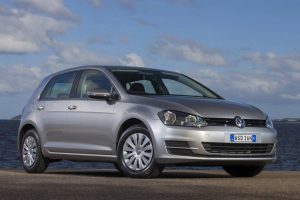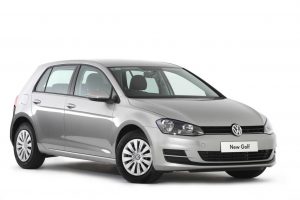Recalls: Volkswagen Mk.7 Golf
Overview
Manufacturers, or importers, issue recalls for defects or faults which have the potential to cause injury. Generally, manufacturers will inform the original buyers if their vehicle is subject to a recall and of the steps required to remedy the defect or fault. Please note that the recalls below (if any) are for Australian-delivered vehicles only. Furthermore, the number of recalls should not be taken as an indication of a model’s reliability or its safety more generally.
Recalls: Volkswagen Mk.7 Golf
2013 ‘model year’ Volkswagen Golf: DQ200 DSG
In November 2013, a recall was issued for 2013 model year Volkswagen Golf vehicles with seven-speed DQ200 DSG transmissions. In these vehicles, electrolysis of sulphur constituents in the synthetic oil could cause them to separate and accumulate between electrical conductor paths. In turn, this could create a short circuit and blow the gearbox fuse, causing the clutch to fully open. While the majority of failures occurred on start-up when the vehicle was stationary, a failure when the vehicle was in motion would result in a sudden loss of power at the wheels. All other functions of the vehicle, however, would remain active. As part of the recall, the synthetic transmission oil was to be replaced with mineral oil (PRA 2013/13835).
2016 ‘model year’ Volkswagen Golf: child lock
In June 2016, a recall was issued for certain 2016 ‘model year’ Volkswagen Mk.7 Golf vehicles because the detent lever of the child lock was damaged during the production process and could break. As a result, an active child lock could be unnoticeably switched off – this could enable a child to open a rear door from the inside when the child lock appeared to be on. As such, this condition could increase the risk of injury to vehicle occupants (PRA 2016/15463).
2016 and 2017 model year Volkswagen Golf: incorrect tyre placard labels
In March 2017, a recall was issued for 2016 and 2017 model year Volkswagen Golf vehicles because they may have tyre placard labels that displayed the wrong wheel and tyre specifications. If the wrong wheel and tyre combination were fitted to the vehicle, the handling of the vehicle could be adversely affected – this could pose a hazard to vehicle occupants and road users. For the VINs of the recalled Volkswagen Golf vehicles, please see PRA 2017/15955.
2017 model year Volkswagen Mk.7 Golf: airbag and/or belt tensioner may not deploy
In April 2017, a recall was issued for 2017 Volkswagen Mk.7 Golf vehicles. In the event of a collision, variations in the mixture ratio of propellant for the airbag and belt tensioner may prevent them from deploying; failure to deploy would increase the risk of injury to occupants. For the VINs of the recalled vehicles, please see PRA 2017/16019.
2013-14 Volkswagen Mk.7 Golf: Takata airbag recall
In June 2019, recall campaign 69Q7 was issued for Volkswagen Mk.7 Golf vehicles. These vehicles had Takata driver’s airbags and propellant wafers inside these airbags could absorb moisture over time. In the event of airbag deployment, excessive pressure in the airbag inflator housing could cause it to rupture and metal fragments could be projected through the airbag cushion and into the vehicle’s cabin. These metal fragments posed a risk of serious injury and fatality. For the VINs of the recalled vehicles, please see PRA 2019/17582.
2009-15 model year Volkswagen Mk.6 and Mk.7 Golf DSG: pressure accumulator crack and loss of power
In October 2019, recall campaign 35D8 was issued for 2009-15 Volkswagen Mk.6 and Mk.7 Golf vehicles. Due to a production fault, a crack in the transmission’s pressure accumulator (within the mechatronics housing) could occur. If the pressure accumulator cracked, oil and pressure would be lost in the hydraulic system of the gearbox. If this occurred, the transmission of engine power would be interrupted, similar to depressing the clutch in a vehicle with a manual transmission – this increased the risk of a collision and injury to vehicle occupants. For the VINs of the recalled vehicles, please see PRA 2019/17886. AustralianCar.Reviews understands that the recalled vehicles had seven-speed DQ200 DSG transmissions.
2013-15 Volkswagen Mk.7 Golf with 7sp DSG: loss of drive
In April 2020, recall campaign 34J5 was issued for Volkswagen Mk.7 Golf vehicles that had seven-speed dual clutch (‘DSG’) transmissions. In these vehicles, a fluid leak could lead to a loss of pressure in the gearbox. This pressure loss could interrupt the transmission of power between the engine and gearbox, causing a loss of drive – this increased the risk of a collision and posed a hazard to both vehicle occupants and other road users. For the VINs of the recalled vehicles, please see PRA 2020/18258.
Problems and faults: Volkswagen Mk.7 Golf
Overview
This section identifies potential problems, causes and fixes based on the experiences of owners and repairers, online sources and technical service bulletins. This information is provided solely for reference purposes and AustralianCar.Reviews recommends that only properly qualified persons carry out repairs or modifications. Furthermore, the number of items identified below should not be taken as an indicator of a model’s reliability or the frequency with which they may occur.
To report a problem or fault to the AustralianCar.Reviews team, please use the Contact Us form. Note that AustralianCar.Reviews does not offer advice on automotive problems or disputes; such enquiries will not receive a reply. For vehicles purchased from dealers after 1 January 2011, please see our Australian Consumer Law fact sheet.
Volkswagen Mk.7 Golf: knocking/rattling noise from rear suspension
In Volkswagen Mk.7 Golf vehicles that have independent rear suspension, there have been reports of a loud rattling or knocking noise from the rear suspension when the vehicle is being driven at speeds up to 50 km/h; the noise has also been described as a ‘hollow popping’ noise and akin to ‘logs rolling around in the boot‘.
The rear suspension noise has been attributed to excessive play in the rear Sachs shock absorbers where the piston rod enters the shock absorber barrel. Although Volkswagen claimed to have introduced a ‘revised’ shock absorber in 2013, suspension noise has continued to occur in post-2013 Volkswagen Mk.7 Golf vehicles. To fix the noise, it has been recommended that the standard Sachs shock absorbers be replaced with Bilstein shock absorbers (part number BLS19-230559).
In a complaint with the UK Financial Ombudsman Service (Decision Reference DRN4049309), Volkswagen Financial Services UK admitted that there was a ‘known issue’ with rear suspension noise. Furthermore, the Financial Ombudsman concluded that the rear suspension noise was a ‘recognised manufacturing fault’ which had been present in the vehicle since its sale.




